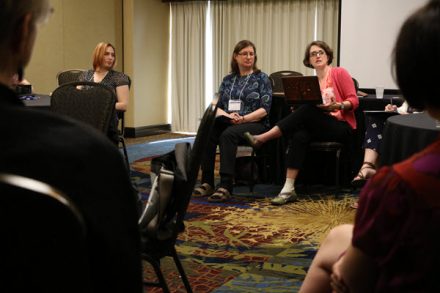As part of the “Collaborative Humanities Redesign Project” (CHRP), a three-year interdisciplinary, cross-campus initiative funded by Teagle Foundation, faculty from Elon, Park and Rockhurst universities and the University of Kansas came together for the third time this September to collaborate on instructional design with the goal to enhance teaching in the humanities.

As part of the Collaborative Humanities Redesign Project (CHRP), a three-year interdisciplinary, cross-campus initiative funded by Teagle Foundation, faculty from Elon, Park and Rockhurst universities and the University of Kansas came together for the third time this September to collaborate on instructional design with the goal to enhance teaching in the humanities.
In the first year of the project, participants critically examined their teaching practices and pedagogical philosophies; brainstormed ideas for teaching innovations that would, in concrete and observable ways, improve student learning; and developed specific plans for implementing the changes. During the second year of the project, faculty experimented with some of the proposed innovative approaches, observed, evaluated and assessed their effectiveness on student learning.
As the Collaborative Humanities Redesign Project is wrapping up this year, participants are preparing portfolios that will make their particular teaching innovations accessible to the widest audience possible. In addition, many faculty participants plan to disseminate their work via professional conferences and publications.
Throughout the duration of this interdisciplinary and cross-campus project, faculty from all four universities met virtually and in person to share ideas and offer each other feedback on various experimental and innovative teaching strategies. Speaking about the grant’s success, Elon Professor Deandra Little, who is a member of the leadership group of the project, responded that, “many of these innovations made powerful and lasting impressions” Another member of the leadership group, Dan Bernstein, has noted that “[a]fter three years CHRP has shown that a community of scholars can become a sufficient audience to help develop and sustain a body of excellent instruction and learning.”
Elon faculty participating in the CHRP include: Deandra Little, Robin Attas, Olivia Choplin, Brandon Essary, Ketevan Kupatadze, Kristina Meinking, and Shawn Tucker.
Robin Attas, assistant professor of music, focused her attention on MUS 211: Materials of Music III, the third music theory course in a four-semester sequence required for most music majors. Robin focused on ways to better teach the activity of music analysis as a “whole-body” process that involves listening and playing the music as well as looking at a score and thinking about concepts and analytical strategies. She redesigned in-class activities to include more expert demonstration of this “whole-body” process, and out-of-class assignments to guide students step-by-step towards better incorporation of all aspects of musical engagement in their analytical and written assignments.
Olivia Choplin, associate professor of French, has been redesigning French 222: Intermediate French 2, the fourth semester of college-level instruction. In this course themed “The Stories We Tell,” students solidify their understanding of linguistic concepts through the study of authentic French-language texts including folk tales, a sitcom, articles from the media, and a short novel. Students study grammatical concepts outside class and are then are asked to identify and think about those concepts as they appear the primary texts they are reading for the course. Class discussions encourage them to use new grammatical concepts as they attempt to make connections between the texts they read and the cultural perspectives that those texts reveal. The course thus focuses on linguistic proficiency, critical thinking, and intercultural competency.
Brandon Essary, assistant professor of Italian, discovered through his redesign project of ITL 121 that, especially at the 100 level, students need the chance to speak in English occasionally to think more deeply and critically about the complex subject of intercultural competence. The majority of class is still taught in Italian; however, he now offers concentrated, high-impact activities in English to stimulate deep thinking and discussion about culture with students. These activities recognize that students might not speak Italian for the rest of their lives. However, they will travel to other lands and encounter people from other cultures at home or abroad. The lessons of intercultural competence – identifying significant cultural elements, comparing and contrasting cultures with nuance, and critically thinking about the reasons for these elements and the values of the target culture – can and will serve them no matter where they go, no matter what languages they speak.
Ketevan Kupatadze, senior lecturer in Spanish, often teaches 300-level advanced reading and writing courses in Spanish that are considered to be transitional from the study of linguistic skills to their use in meaningful contexts that develop students’ critical thinking and cultural competence. Her focus has been mainly on developing students’ ability to engage in meaningful and in-depth discussion in a foreign language classroom and developing tools to promote active and engaged learning.
Kristina Meinking, assistant professor of classical languages, worked on Latin 121: Elementary Latin I. Students learned the fundamentals of Latin grammar and Roman culture through a completely reading-based textbook (Orberg’s Lingua Latina), an inductive method that allowed most class time to be spent on reading and re-reading each chapter, extracting grammatical principles, and composing in Latin. They advance only when they had demonstrated their mastery of a set of three chapters by earning a mark of 85 percent or above on what Kristina calls a “challenge.” After the first challenge, students worked in smaller groups of peers who were learning the same set of material and the instructor’s time is divided between all the various groups that exist in any given class meeting.
Shawn Tucker, associate professor of art in the Art and Art History Department redesigned a daily writing assignment he uses in his Laughter and the Humanities course, which now puts students into study groups and asks them respond to specific prompts. Tucker found that the students’ written responses improved with the more specific prompt and with the motivation of being a contributor to a study group.


